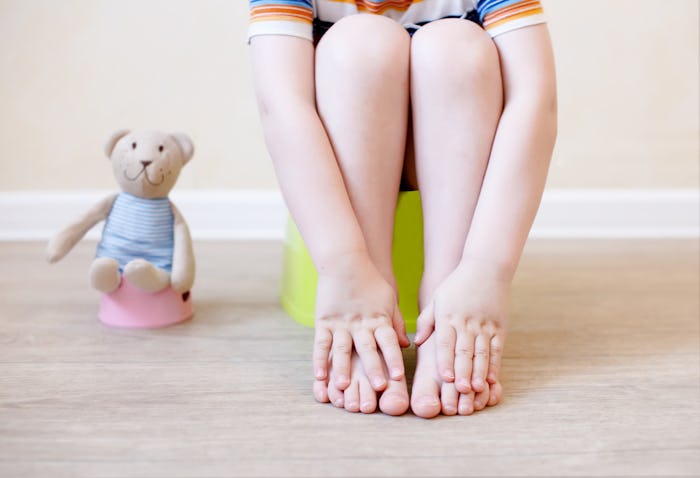Life

The One Thing You Need To Remember With Potty Training Accidents
Every parent has been there: It's the end of a long day and you walk through the kitchen to face the beast of dinner prep, only to feel a wet puddle beneath your bare foot. Your toddler stands before you, as innocent as a dove, and all you can feel is an overwhelming urge to yell expletives. But how do you deal with potty training accidents in a way that won't scar your kid for life?
First of all, don't assume your child to be potty trained before he is actually potty trained. It sounds simple enough, but often the frustration with your children stems from holding unrealistic expectations of them. Speaking with Parenting magazine, Edward Christophersen, Ph.D., professor of pediatrics at Children's Mercy Hospital in Kansas City said, "Until a child is 3 and hasn't had an accident for six months, he's not officially potty trained."
Surprised? You're not alone. Many parents are quick to declare potty training a thing of the past after a mere two weeks of dry undies. But taken to heart, Christophersen's advice could mean that simply readjusting your mindset might drastically alleviate much of your discouragement about the process when accidents happen. Remember, it's a marathon, not a sprint.
Other guidelines the Parenting article highlighted include avoiding using negative pressure, and drawing as little attention to the accident as you can. Standard parenting advice usually suggests devoting your attention to positive behaviors and doing your best not to reward undesirable ones with big emotional reactions, lest your little cherub be inspired to continue them. Translated into the realm of potty training: Use positive reinforcement to reward successful trips to the potty, and do your best to play down even the most inconvenient of accidents.
One article in Today's Parent identified common potty training problems and how to solve them. According to author Cheryl Embrett, potty training regression often occurs when there has been a change in the normal schedule. Going on road trips, staying at grandma's, and starting school can all be examples of the kind of exciting stress that often result in accidents. Small children may have a hard time taking a break from engaging play to make a trip to the potty, may be scarred from a particularly embarrassing incident, and some are even afraid of using adult-sized toilets.
The reasons behind accidents may take some detective work from you, but often parents really can understand the rhyme and reason once you make the effort to do so. And even when there is simply no explanation, you can offer your support and understanding. Growing up is not easy, but a little parental empathy goes a long way.
Your child won't go to junior high in diapers. When accidents happen, keeping your cool may be the fastest way to get your tyke back on track. Relax, hug your sweetie, keep your sense of humor, and raid the heck out of your chocolate stash.